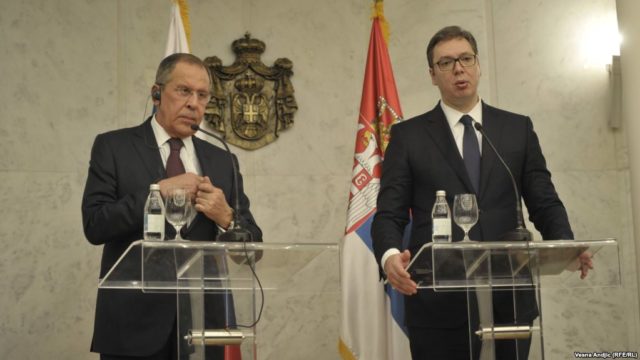
Our Man in Belgrade: Russian Foreign Minister Lavrov Visits the Balkans
Publication: Eurasia Daily Monitor Volume: 15 Issue: 33
By:

Montenegro’s accession to the North Atlantic Treaty Organization (NATO) last year, the European Union’s announcement that it will resume enlargement before 2025 to include at least one Balkan state, Serbia’s evident oscillation between East and West, as well as recent progress on resolving the Greco-Macedonian name dispute have apparently all impelled Russia to intensify its attacks upon Western policy in Southeastern Europe. Starting at the recent Munich Security Conference and then in interviews and during his visits to Slovenia and Serbia, Foreign Minister Sergei Lavrov launched another round of what are now tried bromides and lies about Ukraine, Western policy, and Russia as well as Russo-Western rivalry in the Balkans. Yet, at the same time, he reiterated that Moscow still wants to cooperate with the West (Mid.ru, January 22, February 17, 22).
In reality, what Russia wants most of all is for the process of European integration—or what EU insiders used to call the “finalité” of the Balkans’ integration with the rest of Europe—to be put on ice. This means no resolution of Serb-Kosovar tensions or of the status of Bosnia-Herzegovina. Indeed Russia’s ambassador to Sarajevo, Petr Ivancov, made clear that his government views the EU’s Peace Envoy to Bosnia as no longer necessary. And he implicitly asserted that the whole structure of the Dayton Accords is outdated. Moreover, Ambassador Iancov charged that the West is trying to push Moscow out of the region (Glassrpske.com, November 17, 2017). Indeed, his remarks anticipated Lavrov’s statements in Munich and afterward.
In a series of speeches, interviews and press conferences during and after Munich, Lavrov repeatedly claimed that the West was responsible for the Ukrainian “coup” in 2014 and for the subsequent failure of the Minsk ceasefire accords. Additionally, he alleged that a neo-Nazi movement is springing up throughout Europe. The West, led by Washington, is trying to push Russia out of Europe, he stated. And the EU, instead of becoming an independent and strong actor, as Russia favors (i.e., one disaggregated from the Transatlantic alliance), is trying to expand into the Balkans and force Serbia to impose sanctions on Russia as a condition of membership—even though Moscow claims to support Belgrade’s right to join the EU. Lavrov asserted that Russia and Serbia see eye to eye on the right of states to follow their own independent course—in other words, he suggested that Serbia should refuse to accept Brussels’ conditions and stay out of the EU, not to mention NATO. On regional issues, he added, this means that the United Nations should not let Kosovo in as an independent member and that Kosovo’s final statehood is a violation of prior agreements. That also means Serbia should defy the European Union with respect to the so-called Russian humanitarian intervention center at Niš, which was intended to be a military base and is now accused of directing a regional Russian intelligence network (Mid.ru, February 17, 22).
Lavrov failed to mention, however, that Russian information warfare targeting Serbia has been continuing on a daily basis, same as Moscow’s efforts to win over the Balkan country’s religious (Christian Orthodox) nationalist community, prevent Serb-Kosovar rapprochement, tie Serbia to Russian energy programs and supply Belgrade with arms to prevent it from drifting closer to NATO (Labs.rs, October 26, 2016; EuromaidanPress, January 24, 2017; Defenddemocracy.org, February 2, 2017). Instead, the Russian foreign minister lambasted the European Union for supposedly trying to force Serbia into joining the bloc against Russia. Moreover, he maintained, Washington is pressuring every European country against friendly relations with Russia and is attempting to deprive Moscow of opportunities to sell energy to Europe (Mid.ru, February 19, 2018).
In his speeches and interviews, Lavrov not only attacked US and European policies, he implicitly showed what Moscow wants in Europe: an end to voluntary European integration around NATO and the EU, a disaggregated Europe, diminished Transatlanticism, and a weakened European Commission so that only individual states make deals with Russia. He also promoted the freedom for states to do as they please without having to answer to anyone for their conduct—i.e. the way things are done in Russia, where President Vladimir Putin answers to nobody. Such an international system would effectively give Russia free rein to wage its information wars as well as campaigns of corruption and subversion, etc. across Europe without incurring serious penalties or risks and without having to account for its behavior. In Lavrov’s ideal Europe, Russian energy companies Gazprom, Rosneft, et al. would also face few if any real institutional obstacles to selling gas and oil. And the receipts of those sales—presumably negotiated bilaterally with European customers with limited leverage over Moscow—would fund the corruption and subversion of other states, creating permanent pro-Russian political/economic constituencies across the continent.
In almost all of his stops in the Balkans, Lavrov also invariably cited the shared historical-cultural-religious background of Russians and the Serbs and other Balkan peoples (Mid.ru, February 19, 22). To be sure, there is considerable affinity in these spheres among many (not all) Balkan states and Russia. But a dispassionate look at this history reveals many examples of cynical manipulation of this idea or affinity and even outright coercive efforts by Russia to force the Balkans states—not excluding Serbia—into its mold and into subservience. The relationship between Joseph Stalin and first Yugoslav leader Josip Tito was a particularly dangerous relatively recent example of such pressure. Thus Moscow’s invocation of a shared history, culture and religion is disingenuous, and both sides know it. But the constant reiteration of the past and the justification of empire in the former Soviet Union and the Balkans in terms of that one-sided view of history shows once again that Russia cannot come to terms with its history nor learn from it. Consequently, paraphrasing the late philosopher and writer George Santayana, Russia will be forced to repeat its history, and its foreign partners should bear that in mind.



